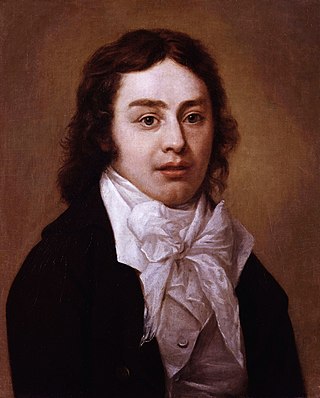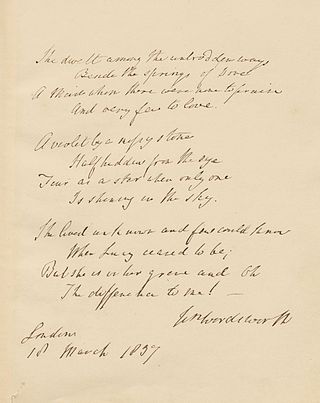External links
Wikisource has original text related to this article:
| Topics | ||
|---|---|---|
| Lyrical Ballads | ||
| Later poetry |
| |
| The Recluse | ||
| Prose | ||
| People | ||
| Homes |
| |
| Related | ||
"Three years she grew in sun and shower" is a poem composed in 1798 by the English poet William Wordsworth, and first published in the Lyrical Ballads collection which was co-written with his friend and fellow poet Samuel Taylor Coleridge. As one of the five poems that make up the "Lucy series," the work describes the relationship between Lucy and nature using words and sentiments. The author creates an impression of the indifference of nature as the poem progresses. The care with which Nature had sculpted Lucy, and then casually let her "race" end, reflects Wordsworth's view of the harsh reality of life. Although Nature is indifferent, it also cares for Lucy enough to both sculpt and mould her into its own. Wordsworth valued connections to nature above all else. The poem thus contains both epithalamic and elegiac characteristics; the marriage described is between Lucy and nature, while her human lover is left to mourn in the knowledge that death has separated her from mankind, and she will forever now be with nature. [1]

Samuel Taylor Coleridge was an English poet, literary critic, philosopher, and theologian who, with his friend William Wordsworth, was a founder of the Romantic Movement in England and a member of the Lake Poets. He also shared volumes and collaborated with Charles Lamb, Robert Southey, and Charles Lloyd. He wrote the poems The Rime of the Ancient Mariner and Kubla Khan, as well as the major prose work Biographia Literaria. His critical work, especially on William Shakespeare, was highly influential, and he helped introduce German idealist philosophy to English-speaking cultures. Coleridge coined many familiar words and phrases, including "suspension of disbelief". He had a major influence on Ralph Waldo Emerson and American transcendentalism.

William Wordsworth was an English Romantic poet who, with Samuel Taylor Coleridge, helped to launch the Romantic Age in English literature with their joint publication Lyrical Ballads (1798).
This article contains information about the literary events and publications of 1798.

Dorothy Mae Ann Wordsworth was an English author, poet, and diarist. She was the sister of the Romantic poet William Wordsworth, and the two were close all their adult lives. Dorothy Wordsworth had no ambitions to be a public author, yet she left behind numerous letters, diary entries, topographical descriptions, poems, and other writings.
The Lake Poets were a group of English poets who all lived in the Lake District of England, United Kingdom, in the first half of the nineteenth century. As a group, they followed no single "school" of thought or literary practice then known. They were named, only to be uniformly disparaged, by the Edinburgh Review. They are considered part of the Romantic Movement.
Nationality words link to articles with information on the nation's poetry or literature.

"Ode: Intimations of Immortality from Recollections of Early Childhood" is a poem by William Wordsworth, completed in 1804 and published in Poems, in Two Volumes (1807). The poem was completed in two parts, with the first four stanzas written among a series of poems composed in 1802 about childhood. The first part of the poem was completed on 27 March 1802 and a copy was provided to Wordsworth's friend and fellow poet, Samuel Taylor Coleridge, who responded with his own poem, "Dejection: An Ode", in April. The fourth stanza of the ode ends with a question, and Wordsworth was finally able to answer it with seven additional stanzas completed in early 1804. It was first printed as "Ode" in 1807, and it was not until 1815 that it was edited and reworked to the version that is currently known, "Ode: Intimations of Immortality".

"Strange fits of passion have I known" is a seven-stanza poem ballad by the English Romantic poet William Wordsworth. Composed during a sojourn in Germany in 1798, the poem was first published in the second edition of Lyrical Ballads (1800). The poem describes the poet's trip to his beloved Lucy's cottage, and his thoughts on the way. Each of its seven stanzas is four lines long and has a rhyming scheme of a-b-a-b. The poem is written in iambic tetrameter and iambic trimeter.

"She Dwelt Among the Untrodden Ways" is a three-stanza poem written by the English Romantic poet William Wordsworth in 1798 when he was 28 years old. The verse was first printed in Lyrical Ballads, 1800, a volume of Wordsworth's and Samuel Taylor Coleridge's poems that marked a climacteric in the English Romantic movement. The poem is the best known of Wordsworth's series of five works which comprise his "Lucy" series, and was a favorite amongst early readers. It was composed both as a meditation on his own feelings of loneliness and loss, and as an ode to the beauty and dignity of an idealized woman who lived unnoticed by all others except by the poet himself. The title line implies Lucy lived unknown and remote, both physically and intellectually. The poet's subject's isolated sensitivity expresses a characteristic aspect of Romantic expectations of the human, and especially of the poet's condition.

The Lucy poems are a series of five poems composed by the English Romantic poet William Wordsworth (1770–1850) between 1798 and 1801. All but one were first published during 1800 in the second edition of Lyrical Ballads, a collaboration between Wordsworth and Samuel Taylor Coleridge that was both Wordsworth's first major publication and a milestone in the early English Romantic movement. In the series, Wordsworth sought to write unaffected English verse infused with abstract ideals of beauty, nature, love, longing and death.
William Wordsworth was an English Romantic poet who, with Samuel Taylor Coleridge, helped launch the Romantic Age in English literature with their 1798 joint publication, Lyrical Ballads. His early years were dominated by his experience of the countryside around the Lake District and the English moors. Dorothy Wordsworth, his sister, served as his early companion until their mother's death and their separation when he was sent to school.
The "Matthew" poems are a series of poems, composed by the English Romantic poet William Wordsworth, that describe the character Matthew in Wordsworth's poetry.
"Lucy Gray" is a poem written by William Wordsworth in 1799 and published in his Lyrical Ballads. It describes the death of a young girl named Lucy Gray, who went out one evening into a storm.

"I travelled among unknown men" is a love poem completed in April 1801 by the English poet William Wordsworth and originally intended for the Lyrical Ballads anthology, but it was first published in Poems, in Two Volumes in 1807. The third poem of Wordsworth's "Lucy series", "I travelled..." was composed after the poet had spent time living in Germany in 1798. Due to acute homesickness, the lyrics promise that once returned to England, he will never live abroad again. The poet states he now loves England "more and more". Wordsworth realizes that he did not know how much he loved England until he lived abroad and uses this insight as an analogy to understand his unrequited feelings for his beloved, Lucy.
Lines Written at Shurton Bars was composed by Samuel Taylor Coleridge in 1795. The poem incorporates a reflection on Coleridge's engagement and his understanding of marriage. It also compares nature to an ideal understanding of reality and discusses isolation from others.
Lines on an Autumnal Evening was composed by Samuel Taylor Coleridge in 1793. The poem, rewritten throughout Coleridge's life, discusses nature and love. As Coleridge developed and aged, the object of the poem changed to be various women that Coleridge had feelings toward.

The conversation poems are a group of at least eight poems composed by Samuel Taylor Coleridge (1772–1834) between 1795 and 1807. Each details a particular life experience which led to the poet's examination of nature and the role of poetry. They describe virtuous conduct and man's obligation to God, nature and society, and ask as if there is a place for simple appreciation of nature without having to actively dedicate one's life to altruism.
"A slumber did my spirit seal" is a poem written by William Wordsworth in 1798 and published in the 1800 edition of Lyrical Ballads. It is usually included as one of his The Lucy poems, although it is the only poem of the series not to mention her name. The poem is a mere eight lines long; two "stanzas."

Lucy Newlyn is a poet and academic. She is Emeritus Fellow in English at St Edmund Hall, Oxford, having retired as professor of English Language and Literature at the University of Oxford in 2016.

Romanticism was an artistic, literary, and intellectual movement that originated in Europe toward the end of the 18th century. Scholars regard the publishing of William Wordsworth's and Samuel Coleridge's Lyrical Ballads in 1798 as probably the beginning of the movement, and the crowning of Queen Victoria in 1837 as its end. Romanticism arrived in other parts of the English-speaking world later; in the United States, it arrived around 1820.